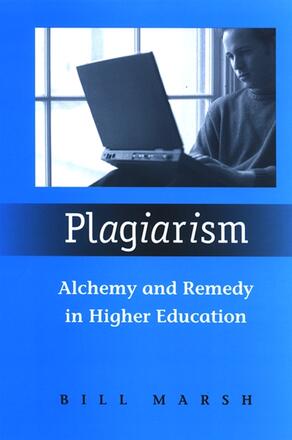
Plagiarism
Alchemy and Remedy in Higher Education
Alternative formats available from:
An in-depth look at the history of plagiarism in light of today’s Web-based plagiarism detection services.
Description
Plagiarism takes an in-depth look at the history of plagiarism in higher education in light of today's Web-based plagiarism detection services. Challenging the widespread assumption that plagiarism is a simple matter of student cheating or scriptural error, Bill Marsh argues that today's teachers and educational institutions may be cheating themselves and their students in pursuing quick-fix solutions to the so-called epidemic of student plagiarism.
When students submit papers cribbed from materials found on the Web or purchase research papers from Internet paper mills, these acts of sedition must also be recognized, for better or worse, as examples of new-media composition techniques. Examining Web-based plagiarism detection services and software such as Glatt, EVE, Plagiarism-Finder, and Turnitin.com, Marsh contends that these services regulate writing and reading practices in ways consistent with precomputer, even preindustrial, efforts to manage and refine human behavior. As he weaves together print history, education, rhetoric, and communication theory, Marsh shows that the rules governing plagiarism and the proper use of borrowed materials have their origins in early intellectual property law, in the reading practices of twelfth-century monks, and the precepts of medieval alchemy. Through an examination of these prescholastic models, this book calls for a revised approach to academic writing in computer-mediated environments.
Bill Marsh is Assistant Professor of English at St. John's University.
Reviews
"Plagiarism: Alchemy and Remedy in Higher Education does important work in several areas and is well worth reading … Each chapter … adds value and perspective to current scholarship on teaching and learning." — Issues in Writing
"…convincingly makes the case that academic institutions need to revise their policies regarding 'borrowing' in light of computer-mediated environments." — SirReadaLot.org
"Most academics have not moved past nineteenth- and twentieth-century ideas about plagiarism. This book could help bring many into postmillennial thinking about this controversial topic." — Deborah H. Burns, Merrimack College
"I appreciate the way the author has explored and complicated the many different facets of plagiarism, including the high-profile cases of Stephen Ambrose and Doris Kearns Goodwin. In addition, Marsh's discussion of the historical underpinnings of our modern (and postmodern) notions of plagiarism is thorough and convincing, helping put the problem of plagiarism into perspective." — Lise Buranen, coeditor of Perspectives on Plagiarism and Intellectual Property in a Postmodern World